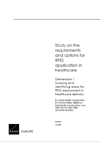 This Report provides an overview of the state of the art in RFID (Radio Frequency Identification) applications in healthcare delivery. It presents the findings of the first phase of a study to identify the policy options that can assist the development and applications of RFID in the delivery of safe and high quality care. The objectives of this first phase - the foundation upon which the rest of the study will be built on - were:
This Report provides an overview of the state of the art in RFID (Radio Frequency Identification) applications in healthcare delivery. It presents the findings of the first phase of a study to identify the policy options that can assist the development and applications of RFID in the delivery of safe and high quality care. The objectives of this first phase - the foundation upon which the rest of the study will be built on - were: - first, to identify and discuss the most relevant areas for deployment and use of RFID in healthcare
- second, to shed light on the most important enablers, obstacles and uncertainties that have the potential to influence RFID use in healthcare applications
- finally, to include a discussion of other alternatives to RFID technologies.
A thorough, systematic review of all relevant literature was conducted to generate a comprehensive overview of the existing information. Peer-review literature and 'grey' literature, including various organisations' reports, presentation material and commercial publications, were identified and searched. An electronic database was created to record the findings. Data were abstracted and recorded in a specially created summary template, then summarised and analysed. We categorised the findings according to RFIDenabling function (tracking, identification and authentication, automatic data collection and transfer, and sensing) and subject (staff, patients, assets and clinical trials). The database included 325 items.
Download Study on the Requirements and Options for RFID Application in Healthcare Report (.pdf, 636 KB).
Download from the eHealthNews.EU Portal's mirror: Study on the Requirements and Options for RFID Application in Healthcare Report (.pdf, 636 KB).
For further information please contact:
Constantijn van Oranje
RAND Europe
37 Square de Meeus
B-1000 Brussels
www.randeurope.org